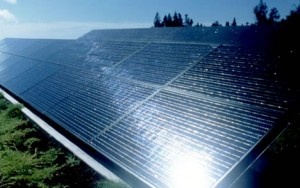 Iran is aiming big with renewables, based on recent statements made by the Iranian Energy Minister, Hamid Chitchian.
Iran is aiming big with renewables, based on recent statements made by the Iranian Energy Minister, Hamid Chitchian.
As revealed by Chitchian, the countryís new goal is to add 5,000 MW of new solar energy and wind energy capacity by the year 2018. Thatís a big increase over the countryís previous aims.
Sort of makes you wonder what it is that they know about the near-term future of the oil industry, doesnít it? Though perhaps the move towards renewables is, at least partially, being pursued more for geopolitical reasons? Itís an interesting question.
The recent comments were made during a gathering with delegates and renewable energy experts at the Iranian Embassy in Berlin, Germany. Among the other information revealed was the fact that the majority of the new capacity will be from wind energy projects, but that 500 MW has already been designated for solar PV.
In a sign of just how committed Iran appears to be to the new goal, the country has apparently already begun construction on 400 MW of new projects ó a further 900 MW worth of contracts have also already been signed.
According to the delegation from Iran, one of the main reasons for the push towards renewables is the fact that energy demand in the country is growing rapidly. As it stands currently, the Iranian grid totals about 70,000 MW of capacity, with demand growing rapidly ó about 5,000 MW per year.
The rapid increase in demand is, to a large degree, down to the fact that electricity in the country is highly subsidized ó if not for that fact, itís highly questionable if growth in demand would be anywhere near where it is.
In order to meet its goals, the country is utilizing a generous feed-in-tariff program ó $0.15 cents per kWh for electricity from renewable energy projects. The government also offers grants that cover up to 50% of the installation costs for residential solar PV systems.
Considering that it was only a few years ago that†Iran opened its first solar power plant, the new goal is really quite impressive. And, if followed through on, it represents a pretty substantial step towards a renewable energy future.
Of course, thatís†if†the goal is met, something that is yet to be seen.
By Clean Technica
The Iran Project is not responsible for the content of quoted articles.

 QR code
QR code